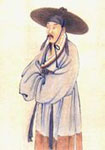吴盐正白山泉香
天气初寒手诀妙,吴盐正白山泉香。
挟书旁观樨子喜,洗刀竭作厨人忙,园丁无事卧曝日,弃叶狼籍堆空廊。
泥为缄封糠作火,守护不敢非时尝。
人生各自有贵贱,百花开时促高宴。
刘伶病酲相如渴,长鱼大肉何由荐?冻齑此际价千金,不数狐泉槐叶面。
摩挲便腹一欣然,作歌聊续冰壼传。
吴盐正白山泉香。宋代。陆游。九月十月屋瓦霜,家人共畏畦蔬黄;小甖大瓮盛涤濯,青菘绿韭谨蓄藏。天气初寒手诀妙,吴盐正白山泉香。挟书旁观樨子喜,洗刀竭作厨人忙,园丁无事卧曝日,弃叶狼籍堆空廊。泥为缄封糠作火,守护不敢非时尝。人生各自有贵贱,百花开时促高宴。刘伶病酲相如渴,长鱼大肉何由荐?冻齑此际价千金,不数狐泉槐叶面。摩挲便腹一欣然,作歌聊续冰壼传。
《咸齑十韵》是宋代陆游的一首诗词。以下是这首诗词的中文译文、诗意和赏析:
九月十月屋瓦霜,家人共畏畦蔬黄;
In September and October, frost covers the roof tiles, and my family fears the yellowing of the vegetable fields together;
小甖大瓮盛涤濯,青菘绿韭谨蓄藏。
Small jars and large urns are used to store clean laundry, while green vegetables and leeks are carefully preserved.
天气初寒手诀妙,吴盐正白山泉香。
As the weather turns cold, my hands skillfully handle the tasks at hand, while the salt from Wu is pure white and the mountain spring water is fragrant.
挟书旁观樨子喜,洗刀竭作厨人忙,
Holding a book, I watch the joy of the pear blossoms nearby, and I diligently wash the knife to prepare meals as a busy cook.
园丁无事卧曝日,弃叶狼籍堆空廊。
The gardener lies idle, basking in the sun, while discarded leaves pile up in the empty corridor.
泥为缄封糠作火,守护不敢非时尝。
Clay seals are used to store food, and bran is used as fuel for the fire, carefully guarded and not to be consumed out of season.
人生各自有贵贱,百花开时促高宴。
In life, everyone has their own status, and when the flowers bloom, it is time to celebrate.
刘伶病酲相如渴,长鱼大肉何由荐?
Liu Ling, sick and thirsty, longs for fine wine, but how can I offer him a feast of fish and meat?
冻齑此际价千金,不数狐泉槐叶面。
At this time, frozen porridge is worth a fortune, while the faces of foxes, springs, and locust leaves are not worth mentioning.
摩挲便腹一欣然,作歌聊续冰壼传。
With a contented belly from rubbing and massaging, I continue the tradition of singing and passing down the story of the ice jar.
这首诗词以描写九月十月的景象为主题,表达了作者对家庭生活和农事的关注。诗中通过描绘屋瓦上的霜、家人共同忧虑蔬菜的黄落等细节,展现了作者对家庭和农田的关心和责任感。同时,诗中也融入了对自然景物的描绘,如樱花的喜悦、山泉的清香,以及庭院中的落叶等,增添了诗词的意境和情感。最后几句则表达了作者对人生的思考,指出了人生的贵贱和物质的价值观念。整首诗词以平实的语言和细腻的描写展示了作者对生活的热爱和对人生的思考,具有深刻的诗意和赏析价值。
陆游
陆游(1125—1210),字务观,号放翁。汉族,越州山阴(今浙江绍兴)人,南宋著名诗人。少时受家庭爱国思想熏陶,高宗时应礼部试,为秦桧所黜。孝宗时赐进士出身。中年入蜀,投身军旅生活,官至宝章阁待制。晚年退居家乡。创作诗歌今存九千多首,内容极为丰富。著有《剑南诗稿》、《渭南文集》、《南唐书》、《老学庵笔记》等。...
陆游。陆游(1125—1210),字务观,号放翁。汉族,越州山阴(今浙江绍兴)人,南宋著名诗人。少时受家庭爱国思想熏陶,高宗时应礼部试,为秦桧所黜。孝宗时赐进士出身。中年入蜀,投身军旅生活,官至宝章阁待制。晚年退居家乡。创作诗歌今存九千多首,内容极为丰富。著有《剑南诗稿》、《渭南文集》、《南唐书》、《老学庵笔记》等。
